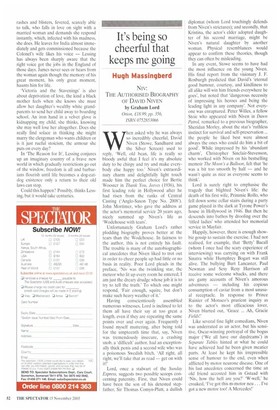It's being so cheerful that keeps me going
Hugh Massingberd
NIV: THE AUTHORISED BIOGRAPHY OF DAVID NIVEN by Graham Lord Orion, £18.99, pp. 356, ISBN 0752853066 \when asked why he was always so incredibly cheerful, David Niven (Stowe, Sandhurst and the Silver Screen) used to reply, 'Well, old bean, life is really so bloody awful that I feel it's my absolute duty to be chirpy and try and make everybody else happy too.' Niven's extraordinary charm and delightfully light touch made him the perfect choice for Bertie Wooster in Thank You, Jeeves (1936), his first leading role in Hollywood after he had risen from the ranks of Central Casting ('Anglo-Saxon Type No. 2008'). John Mortimer, who gave the address at the actor's memorial service 20 years ago, nicely summed up Niven's life as Wodehouse with tears'.
Unfortunately Graham Lord's rather plodding biography proves better at the tears than the Wodehouse. In fairness to the author, this is not entirely his fault. The trouble is many of the autobiographical anecdotes that Niven liked to trot out in order to cheer people up had little or no basis in reality. Poor Lord pleads in the preface, ‘Nliv was the twinkling star, the meteor who lit up every room he entered; I am just the dreary drudge whose job it is to try to tell the truth.' To which one might respond, 'Fair enough, squire, but don't make such heavy weather of it.'
Having conscientiously assembled numerous witnesses, Lord is inclined to let them all have their say at too great a length, even if they are repeating the same points over and over again. Frequently I found myself muttering, after being told for the umpteenth time that, say, Niven was tremendously insecure, a crashing snob, a 'difficult' author, had an exceptionally thick penis and a second wife who was a poisonous Swedish bitch, 'All right, all right, we'll take that as read — get on with it!'
Lord, once a stalwart of the Sunday Express, suggests two possible scoops concerning paternity. First, that Niven could have been the son of his detested stepfather, Sir Thomas Comyn-Platt, a dullish diplomat (whom Lord touchingly defends from Niven's strictures); and secondly, that Kristina, the actor's elder adopted daughter of his second marriage, might be Niven's natural daughter by another woman. Physical resemblances would appear to confirm these theories, though they can often be misleading.
In any event, Stowe seems to have had the most influence on the young Niven. His final report from the visionary J. F. Roxburgh predicted that David's 'eternal good humour, courtesy, and kindliness to all alike will win him friends everywhere he goes', but noted that 'dangerous necessity of impressing his heroes and being the leading light in any company'. Not everyone was enraptured. Peter Willes, a fellow Stoic who appeared with Niven in Dawn Patrol, remarked to a previous biographer, Sheridan Morley, about the star's 'ruthless instinct for survival and self-preservation ... the people he liked best were almost always the ones who could do him a bit of good'. While impressed by his 'abundant charm', Christopher Sinclair-Stevenson, who worked with Niven on his bestselling memoir The Moon's a Balloon, felt that 'he was a bit too smooth by half — and he wasn't quite as nice as everyone seems to think'.
Lord is surely right to emphasise the tragedy that blighted Niven's life: the death of his first wife, Primmie Rollo, who fell down some cellar stairs during a party game played in the dark at Tyrone Power's house in Hollywood in 1946. But then he descends into bathos by drooling over the 'titled ladies' who attended her memorial service in Mayfair.
Happily, however, there is enough showbiz gossip to sustain the exercise. I had not realised, for example, that 'Betty' Bacall (whom I once had the scary experience of interviewing) was carrying on with Frank Sinatra while Humphrey Bogart was still alive. The bullying Burt Lancaster, Paul Newman and Sexy Rexy Harrison all receive some welcome whacks, and there are gamy accounts of Niven's amorous adventures — including his copious consumption of caviar from a most unusual receptacle. In response to Prince Rainier of Monaco's prurient inquiry as to the actor's most efficacious lover, Niven blurted out, 'Grace Ah, Gracie Fields!'
Like several fine light comedians, Niven was underrated as an actor, but his sensitive, Oscar-winning portrayal of the bogus major ('We all have our daydreams') in Separate Tables hinted at what he could have achieved had he been given meatier parts. At least he kept his irrepressible sense of humour to the end, even when afflicted by motor neurone disease. One of his last anecdotes concerned the time an old friend accosted him in Gstaad with `Niv, how the hell are you?' W-well,' he croaked, 'I've got this m-motor neu ... I've got a new motor too! A Mercedes!'


























































































 Previous page
Previous page